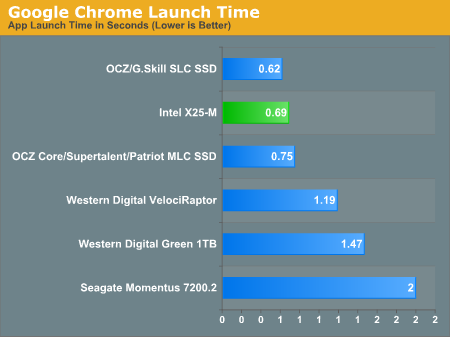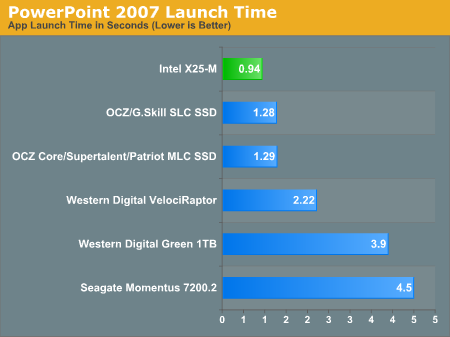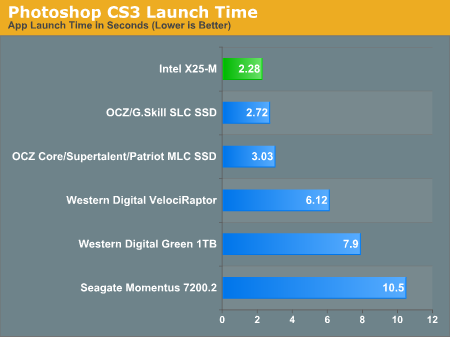The new forums will be named Coin Return (based on the most recent vote)! You can check on the status and timeline of the transition to the new forums here.
The Guiding Principles and New Rules document is now in effect.
Solid State Drives - It's the future, man
OremLK Registered User regular
Registered User regular
 Registered User regular
Registered User regular
AnandTech has a lengthy, in-depth review of Intel's new MLC-based solid state drive, the X25-M. This baby is currently going for $500USD on NewEgg.
It looks kinda like this:

So what's the point? Well, uh, let's see. It's faster. A lot faster. It's quieter--actually, it's dead silent. It's cooler. It uses less power. Oh, and one more thing--no moving parts. So at least theoretically, it's more durable and reliable than a spinning HDD.
One of the problems these drives have historically suffered from is that your data can be lost after a certain number of erase/program cycles (writes, essentially). Intel seems to believe they've solved this problem, and are rating these drives for 100gb/day for 5 years--and the drives will let you know when they start to go, too.
Another issue that MLC solid state drives in particular have suffered is a tendency to pause between small write operations for as long as a second. Intel has also fixed this issue with the X-25.
So when we talk about speed, how much do these drives get you? Well, would you like to load hefty apps like Photoshop in about two seconds? Because, yeah. These guys can handle that.
Selected benchmarks courtesy of the AnandTech review linked above:
Application loading


Multitasking



The bad news: All this amazing performance comes at two prices: The first is, well, price. As I mentioned above, it's $500 for one of these drives. The second is capacity--the drive only offers 80gb. So if you snag one, it might be best to use it as an OS/application drive and rely on old-fashioned drives for actual data storage.
That said, this is a fairly new technology, and I think we'll be seeing a lot of increase in the storage as the price decreases over the next year or two. I know one thing: I won't be building another performance PC without at least one of these drives.
So what do you think? Fad, or the future of data storage?
It looks kinda like this:

So what's the point? Well, uh, let's see. It's faster. A lot faster. It's quieter--actually, it's dead silent. It's cooler. It uses less power. Oh, and one more thing--no moving parts. So at least theoretically, it's more durable and reliable than a spinning HDD.
One of the problems these drives have historically suffered from is that your data can be lost after a certain number of erase/program cycles (writes, essentially). Intel seems to believe they've solved this problem, and are rating these drives for 100gb/day for 5 years--and the drives will let you know when they start to go, too.
Another issue that MLC solid state drives in particular have suffered is a tendency to pause between small write operations for as long as a second. Intel has also fixed this issue with the X-25.
So when we talk about speed, how much do these drives get you? Well, would you like to load hefty apps like Photoshop in about two seconds? Because, yeah. These guys can handle that.
Selected benchmarks courtesy of the AnandTech review linked above:
Application loading



Multitasking




The bad news: All this amazing performance comes at two prices: The first is, well, price. As I mentioned above, it's $500 for one of these drives. The second is capacity--the drive only offers 80gb. So if you snag one, it might be best to use it as an OS/application drive and rely on old-fashioned drives for actual data storage.
That said, this is a fairly new technology, and I think we'll be seeing a lot of increase in the storage as the price decreases over the next year or two. I know one thing: I won't be building another performance PC without at least one of these drives.
So what do you think? Fad, or the future of data storage?
My zombie survival life simulator They Don't Sleep is out now on Steam if you want to check it out.
OremLK on
0
Posts
For some applications I could see the cost being justfiable, but for the average Joe? Not so much. Though it'd be nice if these could someday reach the price range of mere mortals.
Though you could accomplish much the same effect with a RAM disk and a lot of physical memory.
Something that most people forget is that traditional spinning magnetic platter hard drives have a limited lifespan too, because inevitably the bearings fail and the drive no longer works. The difference is that for SSDs, the lifespan is a known quantity and if the drive controller is designed to (as these Intel drives are), it can warn you when it's getting close to the end of its life. I wish normal hard drives could do that. (Yeah, there's S.M.A.R.T., but it's usually too little and too late.)
I just wish price per gigabyte wasn't so damn ridiculous on these things.
I think the size on this series of SSD's is disappointing.. the lure for using them is I/O rates, and you really don't need a high I/O rate to start up applications. Sure, half a second is a lot faster than 2 seconds, but that's not where you're going to spend most of your work day wasting time.
It's hauling around large files or performing operations on those files where you lose time, and an 80GB drive isn't useful for much more than a staging area (ie, copy file off HDD, work with it on SDD, when finishd push back to HDD to make room for another data set).
It's definitely a promising start but I can't see people laying down bread for these things until they can get 250GB for $500.
Not only does it beat other SSD's but its write performance (normally the weakness of SSD's) far exceeds that of the fastest drive currently out by almost double.
For example:
Once SSD's hit an acceptable price for roughly a 100GB drive then i'll be going SSD for my main drive and a normal hard drive for data storage. The read and write performance of a X25-E that'd be 100GB would be awesome for gaming.
---
I've got a spare copy of Portal, if anyone wants it message me.
It's definitely the future but for now it's so expensive you'll only see this stuff in servers at work.
SSDs are definitely the future. While it's not exactly new tech, there is a ton of development going on in the field right now, since netbooks have shown that having a drive that is silent (or damn near - a few high performance SSDs are mounted with fans, but they are literally a whisper), is faster, has a lower power consumption, and is smaller than a standard hard drive is extremely attractive, especially for mobile computers.
Once the price comes down, we're going to see these things everywhere.
And Jesus who outside of a server would even use 100GB/day for five years anyway? In a home setting, the realistic lifetime of those Intel SSDs would be considerably longer.
Intel also has a 160GB SSD for $945.
Toshiba says they've got a 512GB SSD that they're going to show off at the CES. It's supposed to launch Q1/Q2 and set you back about $1,600.
But yeah, once these drop in price to reasonable levels, we'll be seeing them everywhere. You can already tell because every major conventional hard drive manufacturer is either starting production or in production of SSDs.
Steam / Bus Blog / Goozex Referral
I was looking up stuff about Windows 7 and apparently you'll be able to optimize the install for an SSD. Don't know how much of a difference that will actually make, but apparently Microsoft thinks it's important enough to implement.
Steam / Bus Blog / Goozex Referral
I'll second this. My next rig is going to have a Veloci Raptor as the C: drive and a WD Terebyte HD for data storage. I'm actually tempted to go SCSI with the speeds they offer. A SCSI drive that's 300gig and can achieve transfer speeds around 3gigs is still half the price of that 80gig SSD.
Though I would love to put that X25-M SSD in my PS3. http://www.extremetech.com/article2/0,2845,2332520,00.asp
That's easier said than done, disk access is a pretty low level activity and damn near every piece of software is written under the assumption that it can write whenever it wants.
So it'll be pretty impressive if they can optimize heavily for SSD drives.
Well, but with SCSI drives, don't you still have slow access times? I thought that was one of the main attractions of the SSD--it makes your system simply feel more responsive than a spinning disk could ever do.
Plus, with SCSI, you still have to deal with SCSI. And does anybody really want to have to deal with SCSI?
And then there's obviously the heat, noise, and power issues.
Tuning Vista SP4...Windows 7 to perform better with SSDs is not that difficult. The drivers will just have to be more aware of the cluster size for the SSDs (often multiple MBs) and buffer/schedule writes accordingly. System logging and cache systems will have to use larger in-memory buffers to keep from shitting all over the drive all the time.
as an example for newer drives.
It will likely be a while before $/GB though.
Steam / Bus Blog / Goozex Referral
I don't know precisely what their transfer rate a day is, but 100GB/day is probably a fair average.
Steam / Bus Blog / Goozex Referral
Steam / Bus Blog / Goozex Referral
None?
Because almost all of the heat comes from the CPU and power supplies.
Racks of 10,000/15,000rpm hard drives contribute a considerable amount of heat.
Steam / Bus Blog / Goozex Referral
And it's still peanuts compared to the cpu.
Our worker node room consistently overloads its available cooling in the summer. The room with all the disks? It gets warm, but never causes problems.
Because it was 600 bucks when it came out, then it dropped to 500 and has been there for a while so..
Of course, Toshiba looks like they might be doing that soon. Not by the end of the month, though.
but they do get around ten times the write cycles before they die, so there's tradeoffs all around, I guess.
Still, a shitty drive controller can slow SLC drives down just as easily as MLC drives. The one in my Eee (the 901 has a small SLC and a large MLC) still gets bogged down with small, random, rapid-fire writes, although not nearly as quickly or as badly as the MLC, which is near-useless for any practical purpose other than streaming MP3s or something.
This is because the Asus Phision controller is shit.
PSN: TheScrublet
It's an MLC drive so you have about 10,000 write cycles (for each sector), not 100,000, but it does some very good load balancing compared to other drives, so it'll last a lot longer than your typical MLC SSD.
So is it likely that by the time the drive dies there will be newer and cheaper ones available?
I'm tempted to splurg and get one of these for my 60gig PS3.
for pretty much any MLC drive not made by Intel, you'll have some major problems with small, random, rapid file writes, such as those that you get from writing to log files.
Read the article in the OP for details, specifically this page: http://www.anandtech.com/cpuchipsets/intel/showdoc.aspx?i=3403&p=7 and the following one.